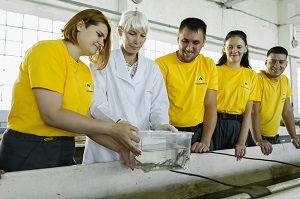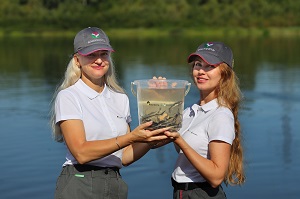Please activate JavaScript in your browser to use all interface options.
Rosneft Enterprises Release About 15 Million Fry into Russian Rivers and Waters in August
08 September 2023
In August, Rosneft subsidiaries released about 15 million fish fry of various species into Russian waters as part of a programme to preserve biodiversity and replenish aquatic bio-resources.
Conserving biodiversity and ecosystems in the regions of operation is one of the priorities of Company’s 2030 strategy. In particular, the efforts of Rosneft and its enterprises are aimed at replenishing water resources and increasing the population of valuable fish species.
 In August, Samotlorneftegaz, one of the Company’s key production facilities, released more than 7 million fry of Siberian sturgeon, muksun and teal into the Ob-Irtysh basin. This is the enterprise’s largest aquatic bio-resource replenishment activity in five years. The fry were bred at the Khanty-Mansiysk Autonomous District – Yugra Fish Breeding Station on behalf of the enterprise and adapted for release in the natural and climatic conditions of Western Siberia.
In August, Samotlorneftegaz, one of the Company’s key production facilities, released more than 7 million fry of Siberian sturgeon, muksun and teal into the Ob-Irtysh basin. This is the enterprise’s largest aquatic bio-resource replenishment activity in five years. The fry were bred at the Khanty-Mansiysk Autonomous District – Yugra Fish Breeding Station on behalf of the enterprise and adapted for release in the natural and climatic conditions of Western Siberia.
Employees of another West Siberian production asset – RN-Nyaganneftegaz – released more than 5.5 million muksun fry into the waters of the Tyumen region and the Khanty-Mansiysk Autonomous District – Yugra. Thanks to the efforts of RN-Purneftegaz, the Ob-Irtysh basin was also replenished with 227,000 peled fry.
 RN-Vankor ecologists released more than 257,000 sterlet fry from the Yenisei population and 785,000 sturgeon fry into the Yenisei. Sterlet and Siberian sturgeon are rare fish species listed in the Red Book of the Russian Federation. As a responsible user of the land, RN-Vankor not only replenishes Siberian rivers with valuable fish species, but also monitors the state of the environment and water bodies near its production sites.
RN-Vankor ecologists released more than 257,000 sterlet fry from the Yenisei population and 785,000 sturgeon fry into the Yenisei. Sterlet and Siberian sturgeon are rare fish species listed in the Red Book of the Russian Federation. As a responsible user of the land, RN-Vankor not only replenishes Siberian rivers with valuable fish species, but also monitors the state of the environment and water bodies near its production sites.
SevComNeftegaz released more than 760,000 fry of valuable fish species into the waters of the Ob-Irtysh basin and the Shershnevskoye reservoir in the Chelyabinsk region, while Kharampurneftegaz released 80,000 muksun fry into Aitor lake, from where the fry will later migrate to the Yendyrskaya canal in the Khanty-Mansiysk Autonomous District – Yugra.
Samaraneftegaz, Novokuibyshevsk Petrochemical Company, Syzran, Kuibyshev and Novokuibyshevsk refineries released a total of over 194,000 sterlet fry into the Saratov reservoir. Thanks to the dedicated work of the subsidiaries, the sterlet population in the Volga reservoirs has increased significantly in recent years.
The Saratov refinery has been carrying out an extensive programme to replenish the Volgograd reservoir for several years. This year, the enterprise’s ecologists released 3.3 thousand fry of Volga sterlets into the reservoir.
 Tyumenneftegaz is stocking rivers and tributaries in the Tyumen region and the Yamalo-Nenets Autonomous District with whitefish fry. In August, more than 41,000 muksun fry were released into the lower Ob river near the town of Labytnangi. Bashneft released 24,700 sterlet fry into the waters of the Republic of Bashkortostan, helping to restore the ecosystems of the region’s rivers and lakes.
Tyumenneftegaz is stocking rivers and tributaries in the Tyumen region and the Yamalo-Nenets Autonomous District with whitefish fry. In August, more than 41,000 muksun fry were released into the lower Ob river near the town of Labytnangi. Bashneft released 24,700 sterlet fry into the waters of the Republic of Bashkortostan, helping to restore the ecosystems of the region’s rivers and lakes.
Every year Angarsk Petrochemical Company implements measures for artificial reproduction of fish stocks. In the summer, the enterprise released 1.5 thousand fry of Baikal sturgeon into the waters of Baikal lake, and the Belaya river was stocked with 10 thousand fry. Under natural conditions, the survival rate of young Baikal sturgeon is low. However, artificially bred fry have already developed the necessary skills to find food and defend themselves against predators by the time they are released, so ecologists predict a high survival rate.
Rosneft
Information and Advertising Department
September 8, 2023

-315xx70.png)

